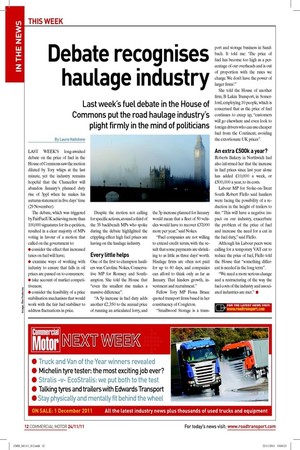Debate recognises haulage industry
Page 10

If you've noticed an error in this article please click here to report it so we can fix it.
Last week’s fuel debate in the House of Commons put the road haulage industry’s plight firmly in the mind of politicians
By Laura Hailstone LAST WEEK’S long-awaited debate on the price of fuel in the House of Commons saw the motion diluted by Tory whips at the last minute, yet the industry remains hopeful that the Chancellor will abandon January’s planned duty rise of 3ppl when he makes his autumn statement in ive days’ time (29 November).
The debate, which was triggered by FairFuelUK achieving more than 100,000 signatures for its e-petition, resulted in a clear majority of MPs voting in favour of a motion that called on the government to: • consider the effect that increased taxes on fuel will have; • examine ways of working with industry to ensure that falls in oil prices are passed on to consumers; • take account of market competitiveness; • consider the feasibility of a price stabilisation mechanism that would work with the fair fuel stabiliser to address luctuations in price. Despite the motion not calling for speciic actions, around a third of the 35 backbench MPs who spoke during the debate highlighted the crippling effect high fuel prices are having on the haulage industry.
Every little helps
One of the irst to champion hauliers was Caroline Nokes, Conservative MP for Romsey and Southampton. She told the House that “even the smallest rise makes a massive difference” .
“A 5p increase in fuel duty adds another £2,350 to the annual price of running an articulated lorry, and the 3p increase planned for January would mean that a leet of 50 vehicles would have to recover £37,000 more per year,” said Nokes.
“Fuel companies are not willing to extend credit terms, with the result that some payments are shrinking to as little as three days’ worth. Haulage irms are often not paid for up to 60 days, and companies can afford to think only as far as January. That hinders growth, investment and recruitment.” Fellow Tory MP Fiona Bruce quoted transport irms based in her constituency of Congleton.
“Smallwood Storage is a trans port and storage business in Sandbach. It told me: ‘The price of fuel has become too high as a percentage of our overheads and is out of proportion with the rates we charge. We don’t have the power of larger irms’ . ” She told the House of another irm, B Lakin Transport, in Somerford, employing 10 people, which is concerned that as the price of fuel continues to creep up, “customers will go elsewhere and even look to foreign drivers who can use cheaper fuel from the Continent; avoiding the extortionate UK prices” .
An extra £500k a year?
Roberts Bakery in Northwich had also informed her that the increase in fuel prices since last year alone has added £10,000 a week, or £500,000 a year, to its costs.
Labour MP for Stoke-on-Trent South Robert Flello said hauliers were facing the possibility of a reduction in the height of trailers to 4m. “This will have a negative impact on our industry, exacerbate the problem of the price of fuel and increase the need for a cut in the fuel duty,” said Flello.
Although his Labour peers were calling for a temporary VAT cut to reduce the price of fuel, Flello told the House that “something different is needed in the long term” .
“We need a more serious change and a restructuring of the way the fuel costs of the industry and associated industries are met.” ■













































